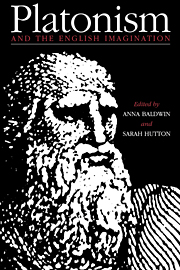Book contents
- Frontmatter
- Contents
- Notes on contributors
- Preface
- I ANTIQUITY
- II THE EARLY CHRISTIAN PERIOD AND THE MIDDLE AGES
- III THE RENAISSANCE AND THE SEVENTEENTH CENTURY
- 7 Introduction
- 8 The transformation of Platonic love in the Italian Renaissance
- 9 Uses of Plato by Erasmus and More
- 10 Italian Neoplatonism and the poetry of Sidney,Shakespeare, Chapman and Donne
- 11 Shakespeare on beauty, truth and transcendence
- 12 Platonism in Spenser's Mutability Cantos
- 13 Reason, Recollection and the Cambridge Platonists
- 14 Platonic ascents and descents in Milton
- 15 Platonism in some Metaphysical poets
- IV THE EIGHTEENTH CENTURY
- V THE NINETEENTH CENTURY
- VI THE TWENTIETH CENTURY
- Bibliography
- Index
8 - The transformation of Platonic love in the Italian Renaissance
Published online by Cambridge University Press: 15 December 2009
- Frontmatter
- Contents
- Notes on contributors
- Preface
- I ANTIQUITY
- II THE EARLY CHRISTIAN PERIOD AND THE MIDDLE AGES
- III THE RENAISSANCE AND THE SEVENTEENTH CENTURY
- 7 Introduction
- 8 The transformation of Platonic love in the Italian Renaissance
- 9 Uses of Plato by Erasmus and More
- 10 Italian Neoplatonism and the poetry of Sidney,Shakespeare, Chapman and Donne
- 11 Shakespeare on beauty, truth and transcendence
- 12 Platonism in Spenser's Mutability Cantos
- 13 Reason, Recollection and the Cambridge Platonists
- 14 Platonic ascents and descents in Milton
- 15 Platonism in some Metaphysical poets
- IV THE EIGHTEENTH CENTURY
- V THE NINETEENTH CENTURY
- VI THE TWENTIETH CENTURY
- Bibliography
- Index
Summary
One of the most serious obstacles to the reception and adoption of Platonism by Italian scholars of the early fifteenth century was the theory of Platonic love. Yet by the middle of the sixteenth century this doctrine had become the most popular element of Platonic philosophy and was playing a significant role in the development of Italian literature. The transformation of Platonic love from an embarrassing liability into a valuable asset was a key episode in the history of Plato's reemergence during the Renaissance as a major influence on Western thought.
Through their knowledge of Greek, Italian humanists became familiar with a wider range of Platonic dialogues than had been known in the Middle Ages; but they did not always like what they read. Among the things they found particularly offensive was the homosexual and pederastic orientation of Platonic love. Leonardo Bruni, the most prominent early translator of Plato, felt obliged to bowdlerise his Latin versions of the Phaedrus (1424) and the Symposium (1435). In Bruni's translation, for instance, Alcibiades' attempted seduction of Socrates (Symposium 215a–22a) becomes a high-minded quest for philosophical enlightenment, with Alcibiades describing himself as ‘inflamed with the desire for learning’. Fascinated though he was by the concept of divinely–inspired amatory fury, as expounded in the Phaedrus, Bruni was simply unable to accept Plato's explicit treatment of homosexuality.
Bruni's contemporary in Florence, the Camaldulensian monk Ambrogio Traversari, had similar scruples.These led him to delete from his Latin version of Diogenes Laertius' Lives of the Philosophers (1433) the homosexual love poems attributed to Plato (iii.29–32),including the lascivious epigram about kissing Agathon. Virtually the only humanist to express appreciation of these poems was Antonio Panormita, author of a scabrous verse collection entitled Hermaphroditus (1425).
- Type
- Chapter
- Information
- Platonism and the English Imagination , pp. 76 - 85Publisher: Cambridge University PressPrint publication year: 1994
- 21
- Cited by



